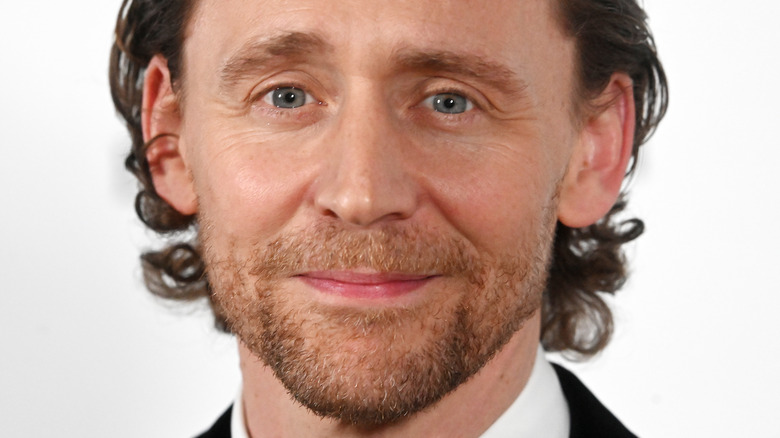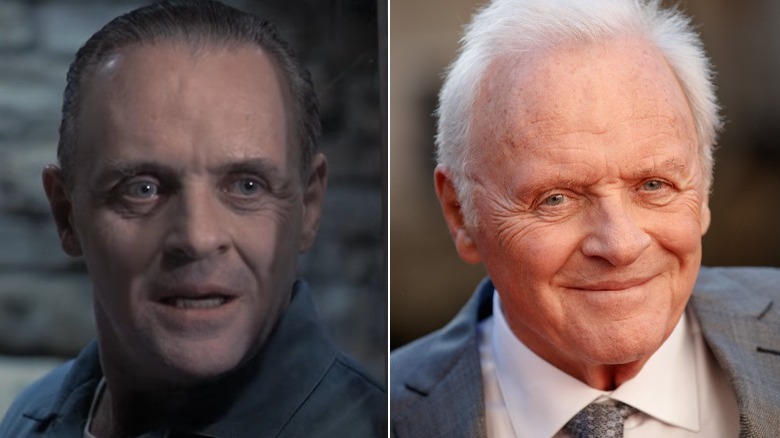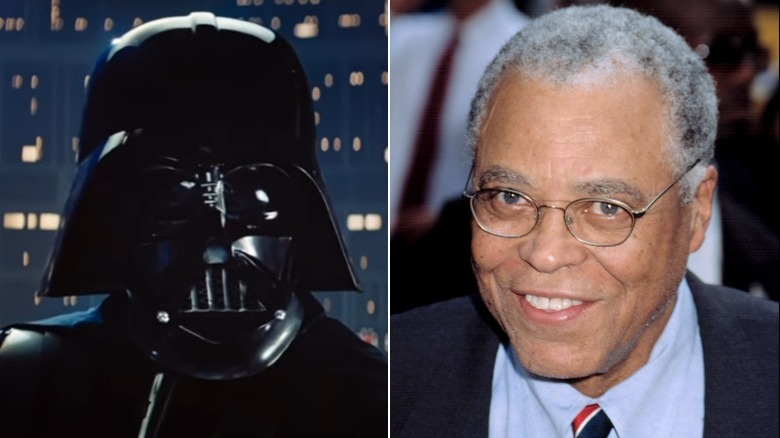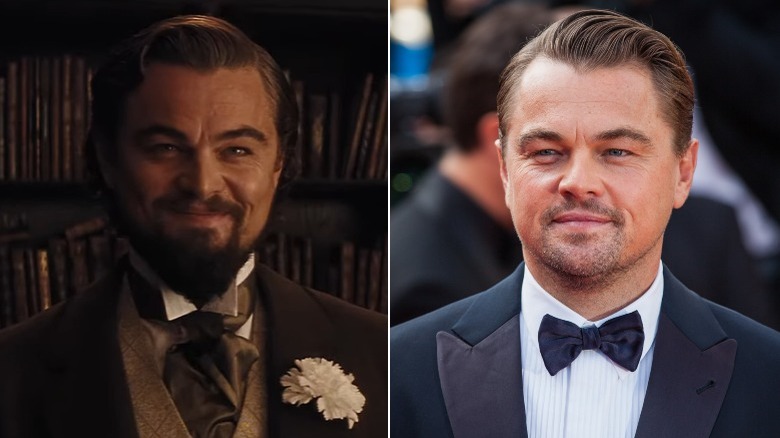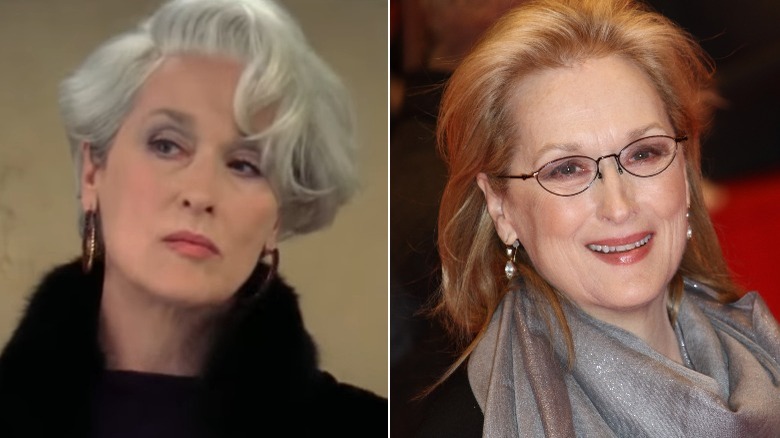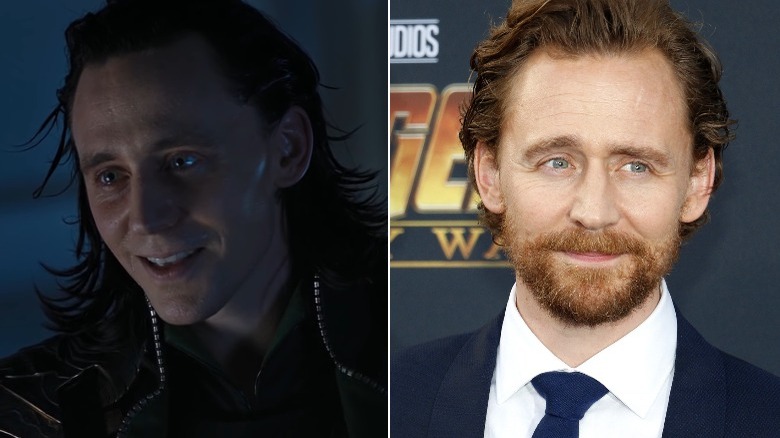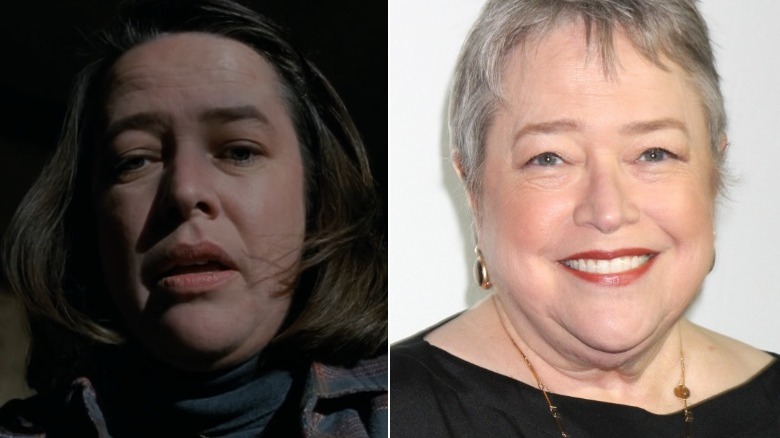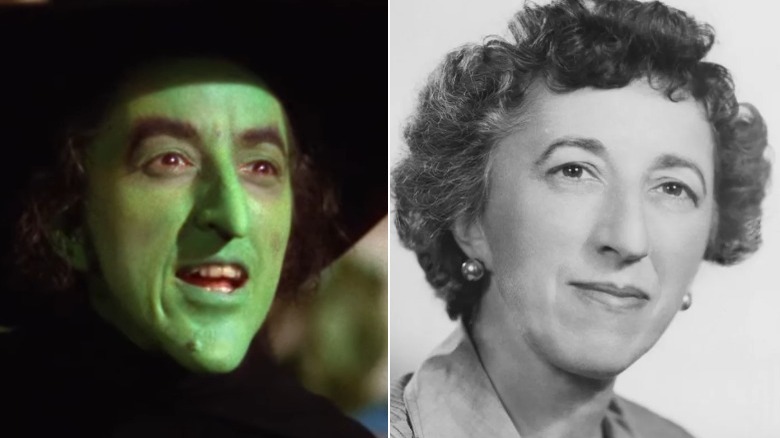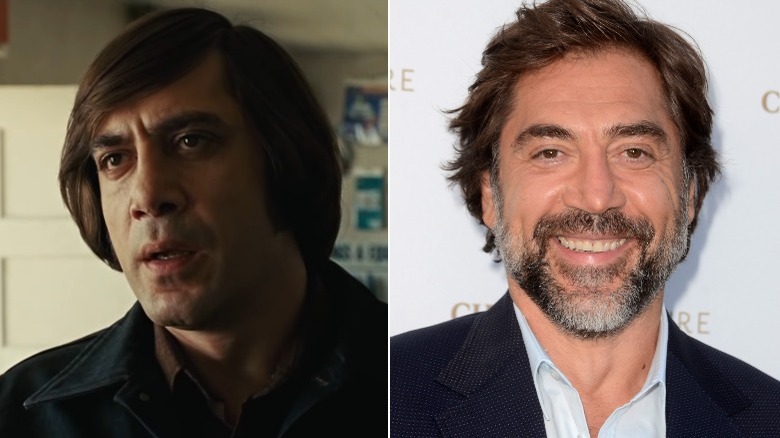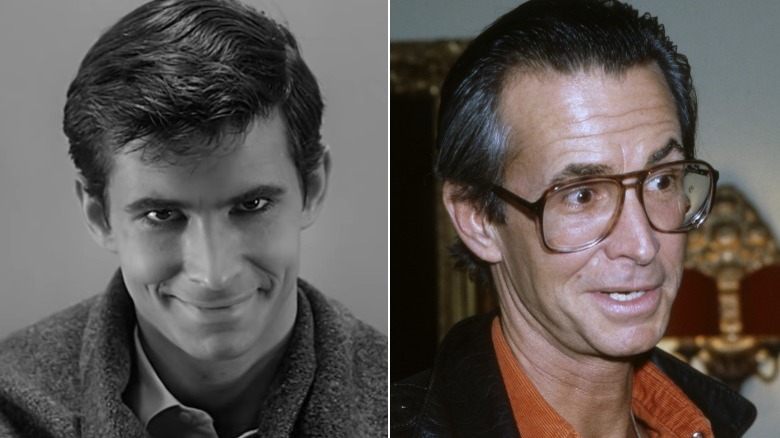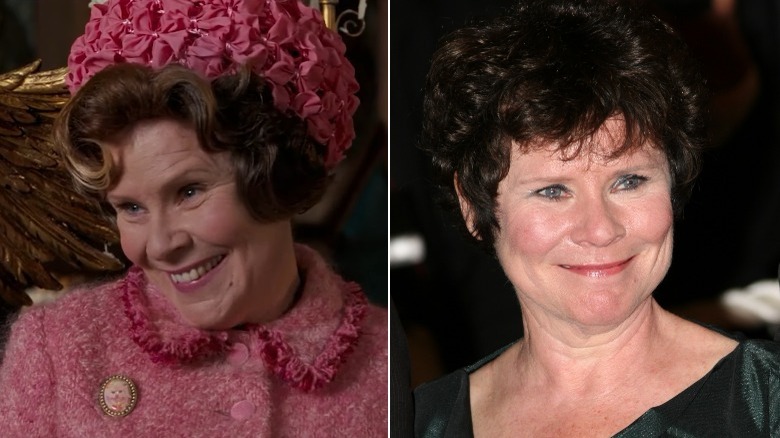Movie Villains Who Are Actually Played By Nice Actors
Since the early days of cinema (and storytelling overall, if you want to get technical), villains have proven to be a captivating draw for audiences everywhere. From the mysterious machinations of the title character in "The Cabinet of Dr. Caligari" and the fearsome visage of "Nosferatu," to the instantly iconic Universal horror monsters, all the way through to the modern day, villains come in all shapes and sizes, and the most effective among them have the power to capture the imagination and haunt your nightmares in equal measure. Many of the most successful films and franchises of all time have at least one distinctive baddie that viewers will love to hate and, despite their better judgment, hate to love.
For the actors portraying such dastardly denizens of the silver screen, it would be easy to assume that one needs to have their own dark side to tap into to bring these characters to life.There are certainly performers who feel uncomfortably close to their roles: Klaus Kinski, who famously played memorable monsters in films like "Aguirre, the Wrath of God" and "Nosferatu the Vampyre," was apparently so notorious for being an actual monster on set that the producers of one film considered killing him for the insurance money when they couldn't control his behavior. However, a surprising number of actors who have played some of the nastiest villains of all time are, by most accounts, absolutely lovely in person. Here are 10 examples.
Anthony Hopkins as Hannibal Lecter
Few villainous performances (or indeed, film characters overall) have left as much of an impression with less than 25 minutes of screen time as Anthony Hopkins did with Hannibal Lecter in "The Silence of the Lambs." A cold, calculating former psychiatrist who has been incarcerated after killing and eating a number of his patients (thus earning the nickname of Hannibal the Cannibal), he is recruited by FBI trainee Clarice Starling (Jodie Foster) to help her get into the mindset of another killer at large. Though not the primary villain of the piece, Hannibal's manipulative nature and chilling cadence made him by far the most memorable character, earning Hopkins an Oscar for Best Actor. He even reprised the role years later in both a sequel ("Hannibal") and a prequel ("Red Dragon").
Though Hopkins certainly has a knack for playing villainous roles (in addition to Hannibal, he has also played antagonists in films as varied as "Fracture" and "The Wolfman"), his reputation in his later years has become more adorable than menacing. His official Twitter profile is a wholesome collection of art appreciation and videos of him attempting various dances. He is also very supportive of performers that he admires: in 2013, following the conclusion of AMC's "Breaking Bad," he penned a heartfelt email to series lead Bryan Cranston and the rest of the cast, in which he proclaimed the following to Cranston: "Your performance as Walter White was the best acting I have seen — ever."
James Earl Jones as Darth Vader
From the moment he emerged into the smoky corridor of a captured Rebel ship in the original "Star Wars," Darth Vader immediately cemented himself as one of the most iconic villains in film history. Even a trilogy of prequels detailing the character's younger and, if we're being honest, whinier years couldn't put a dent in Vader's truly mythic stature. He is so beloved, in fact, that despite his death in 1983's "Return of the Jedi," he still finds himself appearing in modern "Star Wars" entries, most recently in "Rogue One" and the "Obi-Wan Kenobi" series. Though David Prowse's formidable physical presence went a long way towards establishing Vader's bona fides, it was James Earl Jones' intimidating vocal performance that truly defined him.
Jones is of course a legendary voice actor, as anyone who's enjoyed his deeply resonant turns as Mufasa in both versions of "The Lion King" can attest to. This is to say nothing of his decades of stage and screen work. But despite giving voice to such a fearsome Sith Lord as Vader, Jones' vocal prowess was not something he was born with. As a child he suffered from a near-debilitating stutter, which he was only able to overcome through years of training and hard work. He even earned an award from The Stuttering Foundation for using his experience to inspire others. He is also a philanthropist, and has donated to a number of causes over the years, including Habitat for Humanity and the Make-A-Wish Foundation.
Leonardo DiCaprio as Calvin Candie
When he was originally cast as the ostentatious slave owner Calvin Candie in Quentin Tarantino's "Django Unchained," it was seen as very much playing against type for Leonardo DiCaprio. Though he'd portrayed a fair number of morally questionable characters in films like "Gangs of New York" and "Catch Me If You Can," this would be his first time as an out-and-out villain, and he attacked it with relish.
The lip-smacking, gleefully malicious Candie earned every bit of DiCaprio's commitment, including a scene where the actor accidentally cut open his hand without breaking character as he delivers a fiery monologue to the film's heroes. Between his despicable nature and his disgusting teeth, it's easy to lose sight of the charismatic leading man hidden behind this monstrous performance.
Fortunately for everyone, DiCaprio seems to bear little resemblance to this particular role. Margot Robbie, who worked closely with the actor in one of her first major roles for "The Wolf of Wall Street," described working with DiCaprio in an interview with Grazia: "He's an incredible actor, everyone knows that, but he's also a really awesome, down-to-earth person so it was a really lovely experience. I was very fortunate." He is also a passionate advocate for fighting climate change, and formed the Leonardo DiCaprio Foundation, which according to his website, "is dedicated to the long-term health and well-being of all Earth's inhabitants. Through collaborative partnerships, we support innovative projects that protect vulnerable wildlife from extinction, while restoring balance to threatened ecosystems and communities."
Meryl Streep as Miranda Priestly
Meryl Streep may be one of America's most beloved and consistently award-winning performers, but that doesn't mean she always plays it nice. Case in point: her devastatingly dismissive turn as Miranda Priestly, a powerhouse fashion magazine executive in "The Devil Wears Prada."
The adaptation of Lauren Weisberger's novel sees Anne Hathaway play a naive journalism graduate who goes to work for the ruthlessly demanding Priestly, quickly learning that there's no command too outrageous and no decision too cold-blooded for her new boss, who will ruin someone's career without a second thought. The viciously patronizing Priestly quickly became a fan favorite, and netted Streep yet another one of her many, many Oscar nominations.
Luckily, the real-life Streep bears little resemblance to her character here. Hathaway noted in an interview with Vanity Fair that while the legendary actress stayed in character for most of the shoot, overall "she's the most amazing, warm person." It was even revealed in a retrospective of the film for Entertainment Weekly that Streep pushed for Hathaway to get cast in the first place, even though she was not among the studio's top choices.
Shailene Woodley, who worked with Streep on HBO's "Big Little Lies," praised the star for both her kind presence and her work ethic when appearing on The Tonight Show with Jimmy Fallon, stating, "She's so wonderfully generous and immediately disarms you with her generosity. You sort of forget for a moment that you're working with a master of her craft."
Tom Hiddleston as Loki
While it's a well-known fact that the Marvel Cinematic Universe doesn't always produce the most memorable villains, there's a reason that Tom Hiddleston's Loki frequently appears near the top of the list when it's time to rank them. First appearing in the original "Thor," only to graduate to being the main antagonist of "The Avengers" the following year, the character has returned in two "Thor" sequels, was briefly featured in "Avengers: Infinity War" and "Avengers: Endgame," and now has his own Disney+ series, appropriately titled "Loki." Even though more recent entries have rehabilitated him into a more sympathetic anti-hero, the character has always maintained a mischievous wit and a dangerous need for validation that have made him a welcome presence in the long-running saga.
Perhaps a big part of the character's appeal is the presence of Hiddleston, who by all accounts is one of the most graciously charming people in show business. He confessed to Empire (via Fangirl18) that he is motivated to be nice after his first job as a waiter, in which "people would be so extraordinarily rude that it made me decide that I would never be rude in my life, specifically to people who were kind enough to serve me things." In a profile on the actor, The Telegraph went out of their way to describe how his generosity comes through, stating that he's "impeccably well-mannered, he holds doors open, insists on paying for drinks ... [and gives] much more time than he needs."
Kathy Bates as Annie Wilkes
Modern internet culture has exposed us to no shortage of toxic fandoms, but Annie Wilkes from Stephen King's "Misery" may be the grandmother of them all. As hauntingly portrayed by Kathy Bates in Rob Reiner's film adaptation of the same name, Annie is a former nurse who rescues her favorite author (James Caan) from a car crash in a blizzard. The author quickly learns just how deep her obsession goes when she discovers his plans to kill off her favorite character. She imprisons him in her isolated mountain cabin and tortures him until he writes a new manuscript that brings the character back. The role catapulted Bates from a well-liked character actress into a full-on movie star, while winning her an Oscar for Best Actress.
Despite the heightened nastiness of her performance, Bates' real-life persona is far less terrifying. When discussing the film's 25th anniversary with Caan for NBC News, she admits that their big fight scene made her tear up: "I was crying. ... I mean, to have that much violence coming at you..." Caan observed that "she could be pretty scary. But she's really a little mashed-potato sweetheart." She was also highly complimentary of "American Horror Story" creator Ryan Murphy, who she credits with restarting her career by letting her have fun on his series. She relayed as much to The Independent, saying, 'This little kid inside me that loves to dress up and pretend, that I thought was done for, just came to life again. It gave me confidence. And I owe that to Ryan."
Margaret Hamilton as the Wicked Witch
The introduction of color into cinematography was a revelation that must have been both amazing and scary at the same time. Fitting, then, that one of the first mainstream films to really popularize the use of Technicolor in cinema should carry with it an equally scary villain. We're talking of course about the Wicked Witch of the West, played by Margaret Hamilton in "The Wizard of Oz." Featuring a character design that has since become shorthand for witches in all media and a cackling performance that has been often imitated yet never replicated, the Witch served as a perfect foil for Dorothy (Judy Garland) and her friends as they tried to get her home to Kansas.
Despite being most famous for a role that frightened children all over the world, Hamilton actually devoted much of her life to helping them. She was a kindergarten teacher before becoming an actress, and continued to serve on the Beverly Hills Board of Education even after becoming famous. She was well aware of the effect her character had on children, and according to her son, was always quick to comfort them: "Little Johnny would be cowering behind his mother's skirts, and that's when Mom would get down on her knees and coax him around and say, 'Hi, I'm just a nice lady.'" She even appeared on "Mister Rogers' Neighborhood," both in and out of character, to show kids that it was all just pretend.
Javier Bardem as Anton Chigurh
Sometime after the turn of the century, a trend started towards a particular breed of sociopathic villains in film. This can be seen with Heath Ledger's unnerving take on the Joker in 2008's "The Dark Knight," and it can also be seen one year earlier in the character of Anton Chigurh, the villain of "No Country for Old Men." The film, written and directed by Joel and Ethan Coen, stars Josh Brolin as a small-town welder who happens upon a suitcase full of money. He finds himself relentlessly pursued by Chigurh (Javier Bardem), an assassin with no moral boundaries. Human life is so meaningless to Chigurh that he often allows a coin flip to decide whether or not he should murder someone who just happens to be in his way.
The role made an international star out of Bardem and earned him an Oscar for Best Supporting Actor, though he has stayed refreshingly humble about the whole experience. In an interview with The Guardian, he admitted, "When I won the Oscar, I felt great, but it didn't make any sense. It was more: 'Wow, what is this? I need to earn this now so they don't take it out of my hands!'" Despite being commonly associated with villainous characters like Chigurh, he prefers to live in a way that honors his late mother. "Every decision I make now, I think: 'Would this make my mother proud?'" he said. "And if not, I immediately reject it."
Anthony Perkins as Norman Bates
Alfred Hitchcock's "Psycho" is considered by many to be the original slasher film, or at least to have paved the way for the likes of "Halloween," "Friday the 13th," and so forth. But to describe it as only a slasher is to sell it short: this is a masterful exercise in tension and suspense, with a fascinatingly complex individual at the center of it. Norman Bates, as played by Anthony Perkins, initially seems to be an awkwardly endearing motel owner who's at the mercy of his psychotically overbearing mother. At the film's conclusion, however, his mother is revealed to be long dead, with a demented Norman dressing in her clothes and committing murders at what he imagines to be her behest.
Perkins' portrayal is all the more chilling because his initially friendly demeanor contrasts so sharply with his horrific actions. Thankfully, Perkins himself was by all accounts much closer to the former than the latter. In his book "Split Image: The Life of Anthony Perkins," author Charles Winecoff spoke to a number of Hollywood personalities who knew Perkins well. One of them was his "First, You Cry" co-star Mary Tyler Moore, who described him thusly: "He was a charming person, a very keen actor who seemed to love his work ... He was just a nice guy, and not what I had expected at all. I had expected him to be arch and very sophisticated and stylish ... but that's not what you most remembered about him."
Imelda Staunton as Dolores Umbridge
The "Harry Potter" series has no shortage of memorable villains. From Ralph Fiennes' insidious portrayal of the Dark Lord Voldemort to Helena Bonham Carter's deliciously unhinged performance as Bellatrix Lestrange, there are any number of nefarious characters that could have potentially made this list. But the one that fans of the series especially love to hate is none other than Dolores Umbridge, as played by Imelda Staunton in "Harry Potter and the Order of the Phoenix." Her bright pink wardrobe and bubbly disposition make her sheer ruthlessness all the more effective, and despite the fact that Voldemort is a mass-murdering warmonger, it's not uncommon to hear that Umbridge is actually the worst villain in the whole series, which is really saying something.
Much of this can be credited to Staunton's intensely cheery performance, which gives way to sneering malevolence at just the right moments. However, in her interview with EW's Binge podcast, she made it perfectly clear just how different she is from the character she played in the films. "I think she's a bloody monster and to be played as such," the actress stated, describing her as "a completely and utterly deluded woman." When speaking to the Chicago Tribune, she explained how she felt especially awful after filming Harry's infamous detention scene, describing it as "an adult abusing a child, and whether you're a mother or not, for a female to do it to a child is unthinkable and unbearable and intolerable."
